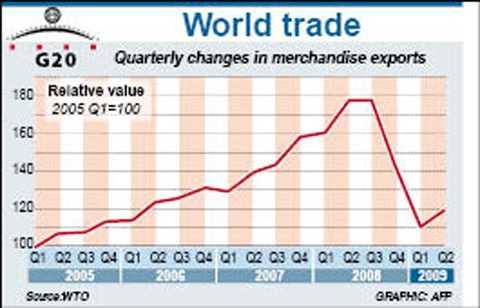Wall Street’s gravity-defying rally found new life over the past week, providing optimism for investors heading into what has historically been one of the best periods of the year.
The markets were able to shake off a disappointing report on the US labor market that sparked renewed doubts about the economic recovery.
Some analysts say the market is slowly gaining confidence that an economic recovery will take root soon. Others say the rally, like the recovery, remains fragile.

Over the past week the Dow Jones Industrial Average vaulted 3.2 percent to end Friday at 10,023.42, as the market rebounded from two weekly losses. The tech-heavy NASDAQ composite advanced 3.29 percent to 2,112.44 and the broad-market Standard & Poor’s 500 index rallied 3.2 percent to 1,069.30.
The market rallied for most of the week in anticipation of Friday’s labor market report, which turned out to be a disappointment. It showed US unemployment jumped to double digits last month for the first time since 1983, reaching 10.2 percent despite narrowing job losses.
Analysts said the report highlighted slow progress in bringing down unemployment as the economy emerges from recession.
Cary Leahey, senior economist at Decision Economics, said the stock market has been able to rally on signs of stronger corporate profits, as companies shed workers to boost their bottom line.
“You have a V-shaped recovery in earnings but the V has stalled in employment,” he said. “That’s why the stock market can rise even when the situation for many Americans is so bad.”
Linda Duessel at Federated Investors said, meanwhile, she expects “upside surprises that are not yet priced into stocks.”
She said consumer spending is recovering, and this is seen in sales of retail goods as well as automobiles, which have topped most forecasts.
“The jobs picture isn’t as clear, but today’s October report sported a big jump in temporary hiring, which is a key component of the monthly jobs report that we have been focusing on, as it is a reliable indicator that tends to lead changes in payrolls by four-and-a-half months on average,” she said.
Duessel said manufacturing, real estate and credit are all showing positive signs as well.
David Rosenberg, chief economist at Gluskin Sheff and Associates, said the stunning market rally of some 60 percent since March has been fueled by speculative cash and a recovery supported by extraordinary government stimulus.
“If the overwhelming consensus is correct that the recession is behind us, then what we have on our hands is the mother of all jobless recoveries,” Rosenberg said. “The stock market has had a history this year of shrugging off weak employment report after weak employment report because the expectation is that we will see further rounds of fiscal stimulus, so it’s hard to say what equity investors will do with this latest piece of data.”
US Global Investors chief executive Frank Holmes said the market has pulled through what is historically the most difficult period of the year and now faces a generally upbeat season.
“November and December are two of the best months over the past 50 years,” he said.
“There are, of course, no assurances, that this year will follow the strong November-December historical trend. In 2007, for instance, the Dow dropped nearly five percent in the last two months of the year as the US and other countries slipped into recession,” Holmes said.
Sam Stovall, equity analyst at Standard and Poor’s, said the past week “was a good example of how determined both the bulls and the bears are on their near-term positions.”
“The market may move to a period of digestion and need a new catalyst, whether it’s guidance from companies, news from economic data or any kind of developments in [merger] activity,” he said.
Bonds fell on the week. The yield on the 10-year Treasury bond increased to 3.503 percent from 3.392 percent a week earlier and that on the 30-year bond rose to 4.394 percent against 4.236 percent. Bond yields and prices move in opposite directions.
The week ahead has a light menu of economic news, including data on the US trade balance. Results are due from retail giant Wal-Mart and the Walt Disney Co.

TAIWAN IS TAIWAN: US Representative Tom Tiffany said the amendment was not controversial, as ‘Taiwan is not — nor has it ever been — part of Communist China’ The US House of Representatives on Friday passed an amendment banning the US Department of Defense from creating, buying or displaying any map that shows Taiwan as part of the People’s Republic of China (PRC). The “Honest Maps” amendment was approved in a voice vote on Friday as part of the Department of Defense Appropriations Act for the 2026 fiscal year. The amendment prohibits using any funds from the act to create, buy or display maps that show Taiwan, Kinmen, Matsu, Penghu, Wuciou (烏坵), Green Island (綠島) or Orchid Island (Lanyu, 蘭嶼) as part of the PRC. The act includes US$831.5 billion in

‘WORLD WAR III’: Republican Representative Marjorie Taylor Greene said the aid would inflame tensions, but her amendment was rejected 421 votes against six The US House of Representatives on Friday passed the Department of Defense Appropriations Act for fiscal 2026, which includes US$500 million for Taiwan. The bill, which totals US$831.5 billion in discretionary spending, passed in a 221-209 vote. According to the bill, the funds for Taiwan would be administered by the US Defense Security Cooperation Agency and would remain available through Sept. 30, 2027, for the Taiwan Security Cooperation Initiative. The legislation authorizes the US Secretary of Defense, with the agreement of the US Secretary of State, to use the funds to assist Taiwan in procuring defense articles and services, and military training. Republican Representative

Taiwan is hosting the International Linguistics Olympiad (IOL) for the first time, welcoming more than 400 young linguists from 43 nations to National Taiwan University (NTU). Deputy Minister of Education Chu Chun-chang (朱俊彰) said at the opening ceremony yesterday that language passes down knowledge and culture, and influences the way humankind thinks and understands the world. Taiwan is a multicultural and multilingual nation, with Mandarin Chinese, Taiwanese, Hakka, 16 indigenous languages and Taiwan Sign Language all used, Chu said. In addition, Taiwan promotes multilingual education, emphasizes the cultural significance of languages and supports the international mother language movement, he said. Taiwan has long participated

The paramount chief of a volcanic island in Vanuatu yesterday said that he was “very impressed” by a UN court’s declaration that countries must tackle climate change. Vanuatu spearheaded the legal case at the International Court of Justice in The Hague, Netherlands, which on Wednesday ruled that countries have a duty to protect against the threat of a warming planet. “I’m very impressed,” George Bumseng, the top chief of the Pacific archipelago’s island of Ambrym, told reporters in the capital, Port Vila. “We have been waiting for this decision for a long time because we have been victims of this climate change for